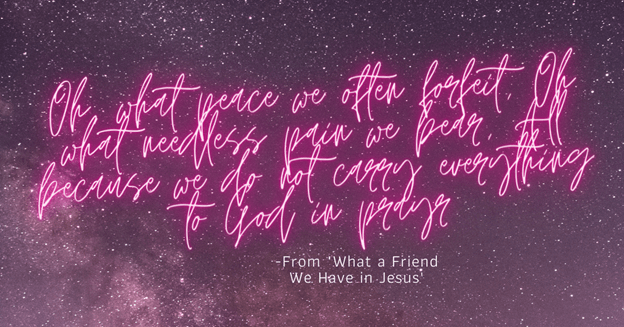
I once heard a pastor joke that there are five answers God can give to our prayers: yes, no, wait, I have a better plan, and you’ve got to be kidding me. His point was that God does always answer our prayers, but not always in the way or timing that we expect—and it’s not always the answer that we want. I’ve thought a lot about that ever since.
If I were to tally up the answers God’s given me over the years, I think “yes” would win by far. I’m not trying to brag—I think this is probably the case with anyone who knows God and goes to him with all their concerns. (It helps to keep a tally of the prayers he’s answered “yes” to. It’s easy to forget successes, like how the weather prediction can be accurate for weeks on end, but the time we remember is the one day when our picnic gets canceled from unexpected rain.) He’s a father who loves to give good gifts to his children, and the Bible is brimming with promises that he’s obligated to keep if we have faith.
But this blog isn’t about when God answers in the way we want him to. It’s about when he doesn’t.

Maybe he’s answered hundreds of my prayers over the years, but lately, he hasn’t seemed to answer the big ones. Not the ones that tear at my heart. Reading over my prayer journal from several years ago, it’s discouraging to see that I was praying about a lot of the same things I am today.
Maybe he’s thinking, “You’ve got to be kidding me,” for some of them. These are prayers that go against his Word, which I shouldn’t be asking in the first place. For example, he isn’t going to grant prayers for revenge, or for a new spouse when you already have one. He also won’t grant prayers that are asked for with the wrong motives (James 4:2-3).
“If I had cherished sin in my heart, the Lord would not have listened” (Psalm 66:18). If we’re purposely doing things that displease him, why would he do what we ask of him?
[Note: Don’t overthink this. You can go crazy wondering if God isn’t answering because deep down, you secretly impure motives, or because you’re too sinful, or whatever. If you’ve confessed your sins to him, he has forgiven them, and if you are asking for things that are not unbiblical, then you’re good. And if you still aren’t sure, ask him to show you. It’s easy to forget that God is a person, not a blank wall, and he’s very much involved in this process. He WANTS us to know him (John 17:26), and the more we know him, the better we’re able to discern his will.]

For other seemingly unanswered prayers, the answer may just be wait. It’s a mistake to put a period where God has put a comma. It’s incredibly tempting to give up when years and years go by and there’s no progress to be seen, Jesus wants us to have persevering prayer, the kind that asks and keeps on asking.

It could be that the answer to our prayer is being delayed due to spiritual warfare (Daniel 10), or simply that the time isn’t ripe for it yet. I’m encouraged by Christians who came before me who persevered in prayer and could testify that, eventually, sometimes after DECADES, God did answer their prayers. [I get so fired up about this. I highly recommend a search on George Mueller’s prayers if you really want to be inspired.]
But what about the prayers that have been denied, even though they were for good things that it seems like God should want, like rescue from suffering, or healing, or for loved ones to be saved, or for a certain door to open?
How do we make sense of that?
I’m reminded of Elisabeth Elliot’s book, These Strange Ashes. In it, she is called to go to Ecuador and begin to translate the Bible for the Colorado Indians. After a year, not only is the trunk containing all of her translation progress stolen, but her only informant, who’s been helping her translate, is murdered, making it impossible to keep going with the work and leaving her to question: Didn’t God care about all the sacrifices she’d made to follow him? More importantly, didn’t he care about the people he’d called her to serve?
“As I look back on that time, I think it was Lesson One for me in the school of faith. That is, it was my first experience of having to bow down before that which I could not possibly explain. Normally we do not have to bow. We can simply ignore the unexplainable because we have other things to occupy our minds. We sweep it under the rug. We evade the questions. …Faith’s most severe tests come not when we see nothing, but when we see a stunning array of evidence that seems to prove our faith vain. If God were God, if he were omnipotent, if He had cared, would this have happened? …I came to nothing, to emptiness… I felt like a son who had asked for a fish and been given a scorpion.”
I think that must the greatest faith there is, the kind that sees a scorpion and even feels its sting, and yet has faith to believe that, somehow, it’s actually a fish. We have to cling to the promise that God is using everything for the good of those who love him.
I plan to go deeper into how to have this kind of faith in another blog, but for now, I want to encourage you with a few truths.

- God wants to give us better gifts
I would venture to say that every ‘no’ is actually an ‘I have a better plan.’
Better how? How is it better for God to withhold the things we desire most? Why is it better for the pain not to stop?
In 2 Cor 4:17, we’re told that our earthly trials are “light and momentary.” We all know that they certainly don’t feel light or momentary. They feel heavy enough to crush us. They feel never-ending. They feel like being a boxer with a bloody lip and bruised everything, crawling back up only to get pummeled again, day after day. So what is Paul saying here?
That these trials are “achieving for us an eternal glory that far outweighs [the trials].” However intense and seemingly unending the pain is, the glory we will later experience will be much greater, and it will be forever.
The present life is very short. Everything God does is with the future in mind. This future:
“And I heard a loud voice from the throne saying, ‘Look! God’s dwelling place is now among the people, and he will dwell with them. They will be his people, and God himself will be with them and be their God. “He will wipe every tear from their eyes. There will be no more death” or mourning or crying or pain, for the old order of things has passed away.’ He who was seated on the throne said, ‘I am making everything new!’ Then he said, ‘Write this down, for these words are trustworthy and true.’
“He said to me: ‘It is done. I am the Alpha and the Omega, the Beginning and the End. To the thirsty I will give water without cost from the spring of the water of life. Those who are victorious will inherit all this, and I will be their God and they will be my children. But the cowardly, the unbelieving, the vile, the murderers, the sexually immoral, those who practice magic arts, the idolaters and all liars—they will be consigned to the fiery lake of burning sulfur. This is the second death.’” (Revelation 21:5-8).
All of us are guilty of some of those things, at the very least idolatry, which is putting something else before God. The only thing that saves us is faith in Jesus. We’re told to rejoice in trials, because they somehow strengthen and purify our faith, which is ‘worth more than gold’ (1 Peter 1:7)
2. The trial won’t last longer than it needs to
“He will sit as a refiner and purifier of silver; he will purify . . . and refine them like gold and silver” (Malachi 3:3).
I can’t remember which devotional I read it in, but they pointed out that silversmiths have to carefully watch over the purification process so that the silver isn’t destroyed. They can’t just leave; they have to sit and watch the entire time it’s in the fire.
That’s what God does for us. He sits. He waits and watches, carefully tending to us, making sure the temperature is only hot enough and the time long enough to purify, not to destroy. When the metal is pure enough for him to see his reflection in it, he takes us out.
God doesn’t enjoy our pain, nor does he waste it.

3. God walks with us in the pain.
He’s said that he’ll never leave or forsake us, and that’s especially true when we’re hurting. Elisabeth Elliot concludes her book by saying:
“It was a long time before I came to the realization that it is in our acceptance of what is given that God gives himself. Even the Son of God had to learn obedience by the things that he suffered…. ‘Surely he hath borne our griefs and carried our sorrows.’ This grief, this sorrow, this total loss that empties my hands and breaks my heart, I may, if I will, accept, and by accepting it, I find in my hands something to offer. And so I give it back to Him, who in mysterious exchange gives Himself to me.”
Jesus knows what it is to suffer. He experienced hunger, betrayal, ridicule, torture, and death. He even knows what it’s like to earnestly pray for something and for that prayer to be denied (Luke 22:42).
I might be praying about (or in some cases lamenting) the same things I was several years ago, but I’m not the same person I was back then. I don’t understand why he won’t give me what I’m asking for any more than I understood it in the beginning… but I trust him enough now that I don’t need to.
How is that possible? By his power. You would think I’d trust him less now, and it’s only because of his faithfulness in being my Comforter, Counselor, and Sustainer that it’s the opposite.
Don’t stop praying. Test your motives, and if he truly says no, then trust him with that, and if you can’t yet, then pray about that too. But if he hasn’t said no, don’t give up. In fact, don’t quit until there’s a clear answer!
I’d like to say a quick prayer for you, if that’s okay.
God, I lift up the person reading this in prayer to you. I ask that you’d open the eyes of their hearts to see you. I pray for comfort if they need comfort, wisdom if they need wisdom, encouragement if they need encouragement, and strength if they need strength. Help them not to be afraid to bring their concerns to you, because you care for them and want to carry their burdens. Thank you that you are the author and perfector of our faith, and I pray that you would bless them with the faith to thank you when you say, “Yes,” and also when you gently say, “I have a better plan.” Amen.


Felt hard
I could relate to it well
Nicely written ✌✌
LikeLike
This is a great read, insight, and wisdom 👏
LikeLike